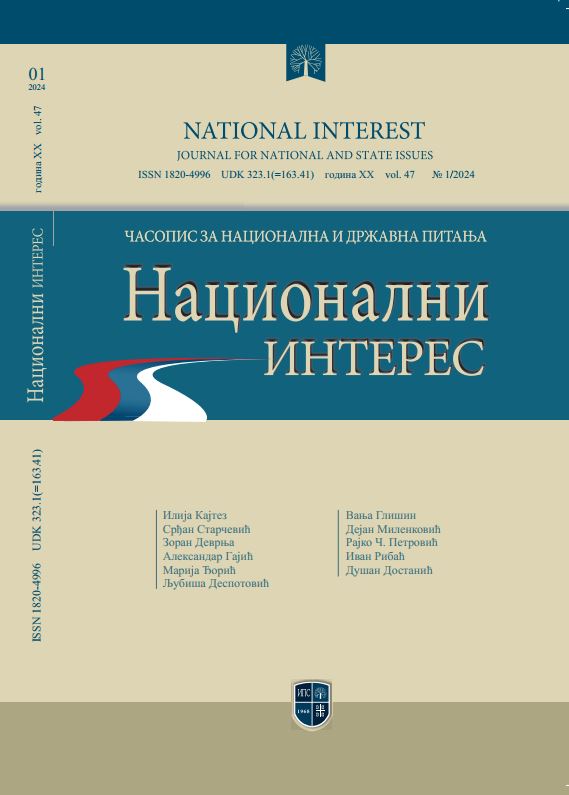THE ROLE OF THE AUTHORITARIAN FUJIMORIST REGIME IN PERU IN SUPPRESSING THE ACTIVITIES OF THE LEFT-WING GUERRILLA GROUPS SENDERO LUMINOSO AND TÚPAC AMARU REVOLUTIONARY MOVEMENT
Abstract
The subject of this research is the analysis of the role played by the Fujimorist regime in Peru, i.e. the rule of Alberto Fujimori in that Latin American country from 1990 to 2000, in suppressing the activities of the left-wing, i.e. Marxist-Leninist guerrilla groups Sendero Luminoso and the Túpac Amaru Revolutionary Movement which represented the main security threat in the observed area from the 1980s to 2000. The basic assumption is that the Fujimorist regime, due to its authoritarian character, had greater success in the fight against Sendero Luminoso and Túpac Amaru Revolutionary Movement than was the case with the democratic regime before it, primarily due to the greater use of violence and brutal methods of suppressing guerrilla activity. The results of the research showed that it was in the period of the 1990s that the greatest successes of the state in the fight against the observed guerrilla groups were achieved, as evidenced, among other things, by the arrest of Sendero Luminoso leader Abimael Guzmán in 1992 and the complete neutralization of the Túpac Amaru Revolutionary Movement in 1997. The conclusion of the research is that the observed case is another indicator that authoritarian regimes, more prone to violence and less interested in human rights and freedoms, tend to solve security problems more quickly and efficiently, such as the activities of guerrilla groups, but also that security risks related to the activities of Sendero Luminoso in Peru still exist, although they are much smaller than before the 2000s. In the research, we used the historical method, the case study method and comparative analysis.
References
Јовановић, Милан. 2018. Ауторитарна политичка култура. Мастер рад. Ниш: Универзитет у Нишу - Правни факултет.
Крстић, Зоран. 2014. ,,Персонализација власти, популизам и каудиљизам у Латинској Америци”. Српска политичка мисао 1 (2014): 215‒234.
Мирковић-Макуловић, Анета. 2019. Ауторитарно наслеђе и консолидација демократије у Србији. Мастер рад. Ниш: Универзитет у Нишу - Правни факултет.
Мишић, Милан (ур.). 2005. Енциклопедија Британика. Београд: Народна књига, Политика.
Петровић, Рајко. 2020. Политичке идеологије у Латинској Америци. Београд: Поредак, Институт за европске студије и Друштво хиспаниста.
Петровић, Рајко. 2023. Политички системи земаља Латинске Америке. Сремски Карловци: Издавачка књижарница Зорана Стојановића и Институт за европске студије.
РТС. 2019. ,,Бивши председник Перуа током хапшења пресудио себи”. 17. априла 2019, https://www.rts.rs/vesti/svet/3493663/bivsi-predsednik-perua-pucao-u-sebe.html.
Albin, Danilo. 2021. “25 años de la toma de la embajada de Japón en Lima, la acción guerrillera que Fujimori cerró con una matanza impune”. Público. 16 de diciembre de 2021. https://www.publico.es/politica/25-anos-toma-embajada-japon-lima-accion-guerrillera-fujimori-cerro-matanza-impune.html.
Baer, Suzie. 2003. Peru's Mrta: Tupac Amaru Revolutionary Movement (Inside the World's Most Infamous Terrorist Organizations). New York: Rosen Young Adult.
Cespedes, Teresa and Wade, Terry. 2009. “Peru's Fujimori gets 25 years prison for massacres”. Reuters. April 8, 2009. https://www.reuters.com/article/worldNews/idUSTRE5363RH20090407/.
de Olarte de Torres-Muga, Liliana. 2010. Historia del Perú. Curso básico online gratuito para hijos de inmigrantes peruanos en Holanda. Lima: Liliana De Olarte de Torres-Muga Publicaciones.
Georgijev, Predrag. 2014. ,,Gerila kao osnovni metod preuzimanja političke moći”. Zeničke sveske: Časopis za društvenu fenomenologiju i kulturnu dijalogiku 19 (1): 182‒186.
Ilizarbe Pizzaro, Carmen. 2023. “Perú: ¿Reimaginar la democracia?” Lasa Forum 54 (3): 30‒34.
La Serna, Miguel. 2023. Con las masas y las armas: Auge y caída del MRTA. Lima: Instituto de Estudios Peruanos.
Milašinović, Radomir i Putnik, Nenad. 2007. ,,Gerila kao specifičan vid društvenog konflikta.” U Gerila na Balkanu, ur. Momčilo Pavlović, Tetsuya Sahara i Predrag J. Marković, 327‒338. Beograd: Institut za savremenu istoriju.
Petrović, Rajko. 2021. „Gerilske grupe kao trajna bezbednosna pretnja za latinoameričke zemlje.“ U Regionalna bezbednost: pristupi, elementi, dinamika, ur. Nevena Šekarić i Vladimir Trapara, Beograd: Institut za međunarodnu politiku i privredu. 187‒216.
Ramírez, Iván y Nureña, César R. 2012. El «pensamiento Gonzalo». La violencia hecha dogma político. Lima: Secretaría Nacional de la Juventud – Ministerio de Educación.

